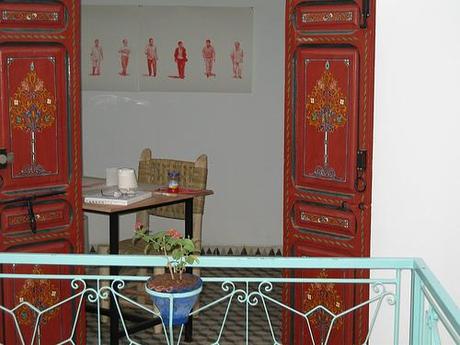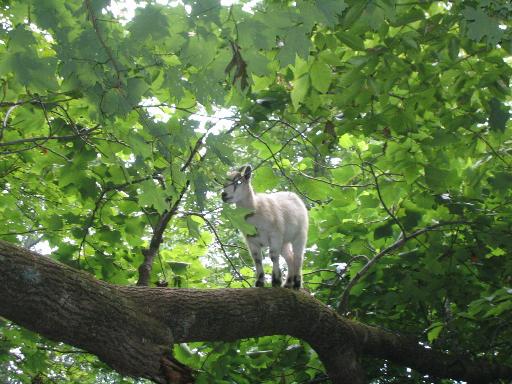Morocco '10 - Sixth Form Expedition to the High Atlas and Sahara
During the summer holiday ten members of the Sixth Form, with Mr and Mrs Bacon and Mr Roe, spent a fortnight in the mountains and desert of Morocco. The physical aims of the expedition were to traverse the Central High Atlas range from north to south, climbing Jebel Mgoun (4,068m) and exploring the Tessaout Gorge en route, to continue south to sample the northern Sahara, and to explore Marrakech.
Absolutely nothing but the flights was booked in advance, so the immediate tasks on landing at Marrakech were to find transport from the airport to the centre of town, to establish a base in Marrakech for the first night, to arrange onward transport to the mountains and to buy enough food for thirteen people to remain self-sufficient for a week on trek. This was all achieved with good humour and efficiency despite the 0300 start from school and the oppressive heat of Marrakech in late July.
We secured transport to the hills and a recommendation for accommodation for our first night in the mountains and, better still, a mountain guide and muleteers for our trek. By the time we bedded down for our first night in Morocco under the stars on a roof terrace overlooking the colourful and noisy Djemaa el-Fna, the hub of ancient Marrakech, with its snake charmers, monkey trainers, acrobats, fortune-tellers and so on, the expedition was ready to go.
The journey east from Marrakech via the provincial centre of Azilal to the Ait Bougoummez Valley took six hours.

Good roads to Azilal gave way to an increasingly tortuous and narrow route through the mountains and finally a dirt track to our jumping off point at the remote village of Ikhf-n-Ighir. Worthy of note, given the nature of the road, was the impressive safety and care of our driver.
At Ikhf-n-Ighir we were well fed and comfortable in a mud-brick village house. The following day, having met our guide and seven muleteers and their beasts, we set off on a delightful walk through the lush orchards and fertile fields, set between arid, steep and towering rock walls on either side of the valley.




Leaving the valley, we trekked upwards beyond the villages and into the high summer pastures grazed by large flocks of sheep and goats, passing the seasonal shelters of their Berber shepherds.



After a wild camp overnight, the second day saw us climbing into an increasingly inhospitable, waterless landscape, over two high passes and down onto the Tarkeddit Plateau, a remarkably beautiful grassy plain quite hidden amid the high mountains.








We rose from sleep on the Tarkeddit Plateau at 0300, stiff from cold and not a little intimidated by the task ahead – a nine hour round trip to the summit of Jebel Mgoun and back. But off we set, upwards into a black and freezing night, our way lit by head-torches. The first warming rays of sun welcomed us to the crater rim as we arrived three hours after setting off from camp and from there it was a magnificent walk for two hours along the sharp edges of the two adjoining craters to the summit. The highest point as far as the eye could see, Mgoun afforded fabulous Atlas views as well as a prospect of the beginnings of the Sahara to the south.








The following day we traversed a remarkable landscape of incredible rock formations, passing the Berber summer camps, some of them occupying caves in the rock walls. We descended along a path hanging over a precipitous gorge and camped by a small farmhouse near the entrance to the Tessaout Gorge. We spent a day exploring the gorge with its impressive 2,000ft flanks and multiple river crossings – up via the path and back along the riverbed.









There followed two demanding days following the Tessaout River from village to village to reach the end of the trek. On the final day we visited Megdaz, a Berber village built into the hillside and celebrated for its impressive architecture and ancient buildings, some of them medieval.





When we reached our transport on the road at Ait Alla, we left our excellent guide, Hamid, and our team of muleteers and drove south to Ouazazarte, where we found a half comfortable hotel with a pool – untold luxury after the rigours of the mountains. That night we celebrated our success in the High Atlas with a wonderful poolside team dinner. Pressing on in the morning, we pushed south along the Draa Valley on the ‘route of the Kasbahs’ – the old trade route form Marrakech to Timbuktu - to Zagora in the northern Sahara. Here it was impressively hot and in the relative cool of the evening we hired camels and rode out into the desert to spend the night under the stars, sleeping on top of a sand dune and watching ‘Berber television’, the lively night sky.







Subsequently, on the long journey back to Marrakech we stopped off at the 11thcentury Kasbah of Ait Benhaddou, now a well-used film set and world heritage site; and from there we crossed the Atlas via the almost impossibly engineered Tizi-n-Tichka road pass. Back in Marrakech we had a day to explore the souks and take in the atmosphere of this colourful and justly legendary ancient capital of Morocco, as well as take the much anticipated team hammam and end of expedition dinner.


This was a diverse and adventurous expedition and it was an outstanding team of sixth-formers who undertook the challenge: their team spirit and resilience were commendable and they were unfailingly good company throughout.
morocco culture,moroccan food,morocco food,moroccan cuisine,morocco beaches,moroccan meal,beaches in morocco,moroccan culture,hercules cave,hercules cave morocco

















 ,moroccan food,morocco food,moroccan cuisine,morocco beaches,moroccan meal,beaches in morocco,moroccan culture,hercules cave,hercules cave morocco
,moroccan food,morocco food,moroccan cuisine,morocco beaches,moroccan meal,beaches in morocco,moroccan culture,hercules cave,hercules cave morocco